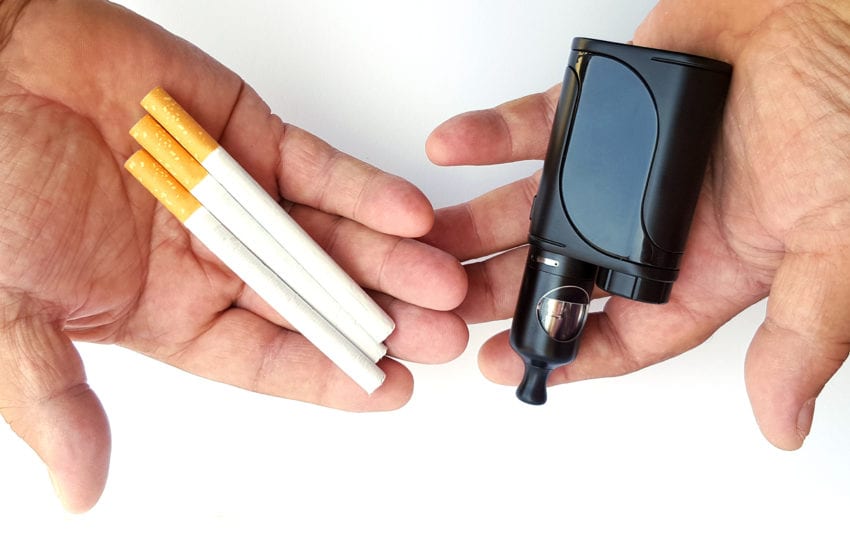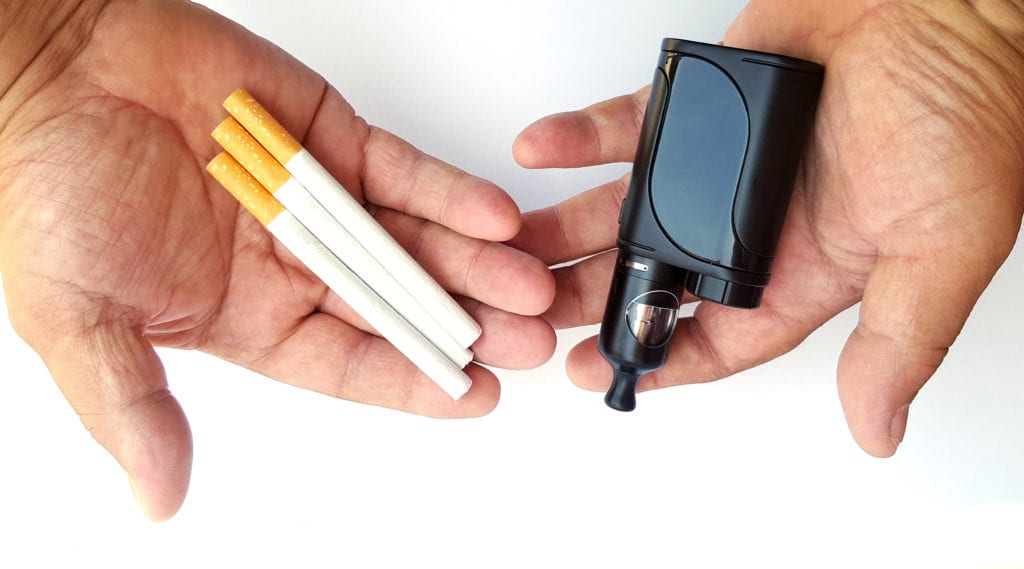Step by Step
- Harm Reduction News This Week
- December 24, 2022
- 16 minutes read

Credit: Balint Radu

Embracing tobacco harm reduction involves more than words, and consumers should be involved.
By George Gay
Earlier this year, I received a press note headed, “Recommendation: Seven steps for the new Italian government to reduce smoking”—a note that also carried the subsidiary heading, “World Vapers’ Alliance presents seven steps toward harm reduction in Italy as the new government takes office.”
This was all very well, but there was something odd about the note because the text gave the first step in the strategy as “embrace tobacco harm reduction.” It seemed that the “seven steps toward harm reduction” had been reduced to one, “embrace tobacco harm reduction.”
This is not meant as a criticism. I’m certain the people at the Alliance know the new Italian government better than I do, and if they decided it was best to keep things simple, if they deemed the government incapable of following a complex, seven-step strategy, who am I to argue? After all, there is no way that I would propose a seven-stage strategy to the U.K. government. Four would be the upper limit:
- Choose a new leader.
- Try not to crash the economy.
- Oh dear, never mind.
- At least try to embrace tobacco harm reduction.
Okay, I lied. I might have a tiny criticism of the press note. One of the people who sat alongside Michael Landl, the Alliance’s director, when the strategy was announced in Rome, was the Italian MEP (Lega party), Gianna Gancia, who said, in reference to the proposed revision of the EU’s Tobacco Products Directive, that it was necessary for the Italian government to insist on some fundamental points concerning legislation on electronic cigarettes.
“In particular, Italy should maintain a wide range of flavors, which would help the consumer in the transition from traditional to electronic smoking …,” she was quoted as saying in part.
To my mind, the reference to “electronic smoking” was unhelpful and unnecessary. It will have played into the hands of the vaping industry’s opponents, who will be whispering into the government’s other ear, “see, they’re both smoking; there is no difference.”
Why, if she wanted to advance the cause of vaping, did she not say, “… which would help the consumer in the transition from smoking to vaping, and in this way, attempt, rightly, to put clear water between smoking and vaping.”
After all, the need for that division is well understood by the Alliance. The strategy announced in Rome is part of a Europe-wide campaign presented under the slogan #BackVapingBeatSmoking.
Words matter. It was unfortunate, though understandable in some respects, that vaping devices were first referred to as electronic cigarettes, but we are where we are. There is no need to hand more ammunition to those opposed to vaping and tobacco harm reduction.
Although I never write headings, I am fascinated by them to the point where I keep pinned to the notice board above my desk one of my all-time favorites, a heading cut from a years-old issue of the London Review of Books, which simply says: “They treat us like shit.”
You could complain that this heading isn’t a good one because it’s not obvious who “they” and “us” are, but, my goodness, it makes you want to read the piece. In fact, it was about those in power in an authoritarian state, the “they,” and the ordinary citizens of that state, the “us.” The heading has about it an air of whimsy on the point of turning violent. It seems to pour from the lips of the downtrodden, who are finally plotting revolution. Of course, it is lifted by the final scatological note, but, above all, to my way of thinking, it is blessed with brevity.
The trouble is that, in going for brevity, you need to be careful not to wind up following the path of reductio ad absurdum, which, I’m afraid, is the route this one from opinion.inquirer.net took: “Harm reduction for tobacco?” When I first read this heading, I was excited because I thought that what was on offer was a forward-looking opinion examining ideas about plant consciousness and whether it is morally wrong to tear leaves off living tobacco plants, process and burn them.
Surely, at the very least, the heading should have read, “Harm reduction for tobacco users?” because that was what the piece was about. Or perhaps not. After all, many of us constantly use the expression “tobacco harm reduction.”
One final point. Since when has it become OK to put a question mark at the end of a heading introducing an opinion piece? An opinion writer surely provides her opinion; she doesn’t pose questions and ask for the reader’s opinion.
It’s little wonder that I’m fascinated by headings. Look at this one from theguardian.com: “Australian teenagers are readily accessing illegal vaping products. Here’s how Christina Watts, Becky Freeman and Sam Egger for the Conversation.”
This, I assume, was written by somebody who believes that it is not only acts that are illegal, a point of view that has made common the hideous phrase “illegal immigrant,” meaning somebody who by their very existence is illegal. This unfortunate person might, in desperation, have committed illegal acts in order to get to what she hopes is a country that will not persecute her, but she is not illegal.
Is this sort of heading just a mistake? I hope so, because otherwise, it is purposely trying to shift the blame from the teenagers to the perfectly innocent vaping products. It is the teenagers who are committing the illegal acts, possibly in cahoots with sellers acting in an illegal manner.
I shan’t comment on the second sentence of the heading, which is simply too awful to contemplate.
I’ll give the headline writer at ctpublic.org her due because it seems she was embarrassed enough to put the phrase, the more lethal product, inside inverted commas: “New Yale study suggests higher e-cigarette taxes could push vapers to smoke ‘the more lethal product.’”I guess she, but not the person responsible for the quote, is aware that there are no degrees of lethal. Something is either lethal or it is not; just as something is unique or it is not, despite the common use of phrases such as “really unique.” But I must say that I would have been more impressed if the heading had been cut after the word “smoke.”
Otherwise, it would have been less coy to have replaced “the more lethal product” with “combustible cigarettes,” or have we become so sensitive that we can no longer refer publicly to combustible cigarettes?
When is a sobriety test not a sobriety test? How about, for instance, when the test is being applied to discover whether you are under the influence of alcohol? That would surely be a drunkenness test.
I started to wonder about this on seeing a Eurekalert news story entitled “Can vaping cause you to fail a sobriety test?” Talking of a sobriety test seems to me to assume that drunkenness is the default setting of the human animal, who has to be tested whenever she displays signs of sobriety: talking coherently, acting rationally and driving in a straight line on a straight road.
But this is nonsense. I mean, no matter what the gleaming adverts might want to make you believe, you don’t go along to your local hospital or clinic to have a wellness test. You go along to find out whether you are suffering from some disease or other. Even if you go along for an annual checkup, the tests are looking for early signs of disease, not early signs of wellness.
The idea of a sobriety test seems to smack of a police state in which people are pulled over for acting in what I would describe as a normal way. And for those people concerned with human rights and the fear generated by slippery-slope theories, it could lead to anxieties over whether people could be pulled over for other normal behaviors: breathing, thinking and being happy.
The heading is also misleading, in my view, because it implies that the fault lies with vaping whereas it lies with the testing, as is almost made clear in the story’s introduction. “While ethanol [alcohol] is often a hidden ingredient in e-liquids, a new study finds vaping won’t trigger a false positive sobriety test—but only if police employ a proper waiting period [between stopping the driver and testing],” the introduction states. It is important to make clear that the “proper” waiting time referred to is in fact the standard time used in a DUI (driving under the influence) roadside stop.
Note, too, how we’ve gone from the possibility of vaping’s causing a person to fail a sobriety test, according to the heading, to the possibility of its causing a “false positive sobriety test,” according to the introduction. What is this “false positive sobriety test?” To me, this means that the person being tested has gotten away with it when she should have been charged with DUI, but according to the context, a person who is positively sober is in fact drunk.
A heading on a recent BBC news story asked the question “Should disposable vapes be banned?” Any thoughts anyone? No?
As is often the case with stories with headings that end in a question mark, no answer was given, though one person, perhaps two, were quoted as saying “yes.” It makes you wonder whether the person who wrote the heading read the story.
Still, I mustn’t grumble. I think the BBC did well to give the issue of disposable vapes an airing, even if the story provided little more than an opportunity for people to complain about how carelessly discarded, disposable vaping products were littering the U.K. and an opportunity for everybody to blame everybody else for this state of affairs. This debate has not been encouraged nearly enough.
There is clearly a need to go back to basics and ask whether vaping devices, disposable or otherwise, are a positive. This means honestly addressing the question of whether we should, in trying to reduce the harm caused to smokers by their consuming combustible cigarettes, allow the further degradation of the environment. Yes, vaping devices might help individual smokers avoid the harms they would otherwise have suffered, but should this be at the expense of the environment and, therefore, everybody?
The answer to this question probably depends on how many smokers can be switched to vaping devices and what is the level of environmental damage that will be suffered. And, of course, into that equation will have to be factored the environmental gains that will accrue because smokers who switch will no longer be discarding cigarette butts.
Other factors will have to cover what percentage of vaping devices are likely to be disposed of properly if widespread recycling systems can be put in place and how efficient will be the recycling processes. It has to be remembered that some things cannot be recycled while others might require huge amounts of energy to recycle them.
A major factor in my view concerns consumer attitudes. The blame for the abundance of cigarette butts that litter our streets and waterways is often heaped on cigarette manufacturers, and I would say that, despite the huge profits they have made over the years, they have never properly got to grips with this problem. But there is no getting away from the fact that it is consumers who drop butts on the ground. If they had been willing to put their butts in designated bins, it would have been a reasonably easy task to have them collected and recycled into pallets and whatever. But too many consumers have never proved amenable to doing this.
The BBC story quoted one former vaper as saying that she had had no idea disposable vaping products were recyclable, adding that the messaging on the products could definitely be improved. “If the vape companies ran social media ads letting people know how to dispose of them, it would grab our attention,” she was quoted as saying.
Now I don’t want to be harsh, but this sounds a bit flaky to me. People shouldn’t think it’s OK to consume an e-cigarette without taking some responsibility for doing so. If you Google “can vapes be recycled,” there is no end of information available. I’m not saying that this information will answer all your questions, but it will answer enough to allow you to dispose of your vaping devices in a way that will cut out much of the environmental damage caused by throwing them on the street.
We should not let consumers get away with not acting responsibly. Otherwise, more people will be answering the heading’s question in the affirmative.
